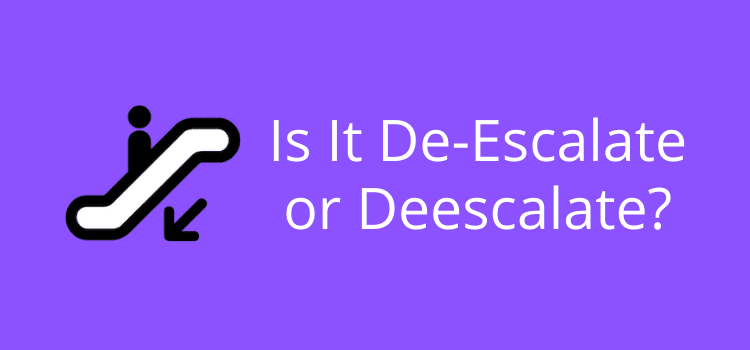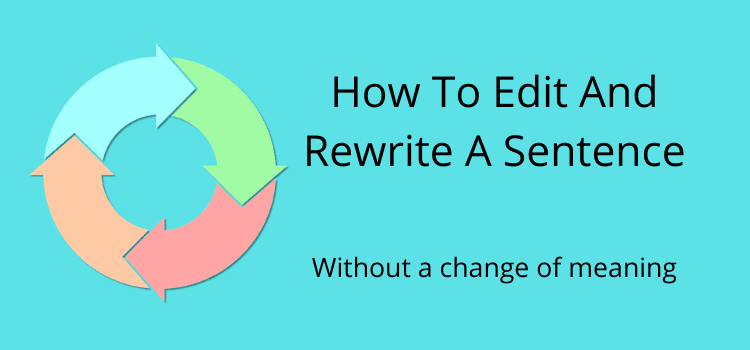
De-escalate or deescalate? Which is the correct spelling? It’s a tricky one because of the problem with two Es. Most dictionaries recommend using the hyphenated form, de-escalate.
The word escalate first appeared in English when it related to the invention of the escalator in 1900.
But did you know that the opposite or negative form of the word escalate was invented by politicians in the nineteen-sixties? Politicians quickly adopted the term de-escalate, which was used to describe decreased tension or conflict.
Adding the prefix de to negate words is in everyday use now. But it is not always the best or most pleasing choice because it can sound awkward or informal.
The origins of the word escalate
The first use of the word escalate dates back to 1900.
At the Exposition Universelle in Paris that year, American inventor Charles Seeberger won the first prize.
His invention was a moving wooden staircase.
He called it an escalator.
The word derives from either the Latin word scala or the French escalier for stair.
Adding the suffix or then indicated it was a tool or machine such as a decorator or calculator.
When Seeberger patented his invention, the word required a capital letter.
The Escalator remained correct until 1950. The US Patent Office then decided that the word was in such common use that it no longer required a capital letter.
From around 1922, the word started to morph into a new verb, to escalate.
It developed many meanings, such as shoot up, mount, surge, spiral, grow rapidly, rise rapidly, climb, go up, or increase rapidly.
How the word de-escalate came into use
According to The Guardian, the first recorded use of the word escalate, meaning to increase in stages, appeared in The Manchester Guardian in 1959.
It was in the context of elevating from traditional warfare to nuclear war.
But it was a word that was prime to have a negative form.
For politicians, the words reduce or decrease didn’t carry much weight.
Words like decertify, debrief, and deregulate had become popular with politicians in the 20th century.
So, it was a natural leap to add the de prefix to escalate.
From around 1964, the word de-escalate or deescalate came into being.
The prefix de means to undo or reverse, so de-escalate took the sense of reducing the intensity of a conflict.
Politicians were drawn to the word de-escalate because it was more powerful and evocative than words like reduce or decrease.
The word conveyed a sense of urgency and importance.
It also suggested a real danger of the conflict getting worse if something was not done.
You only need to do a quick search on the UK Parliament website for de-escalate to discover how frequently the word is used in a political context.
The media and the public then quickly adopted the word.
You now see it in a variety of contexts, including politics, business, and personal relationships.
The problem with the word de-escalate

If escalate means to go up, does de-escalate mean to go down?
Perhaps, but it highlights the problematic use of the word.
Grammatically, escalate is generally intransitive, so it doesn’t require an object.
The price of oil is escalating.
But de-escalate is usually transitive, so it needs an object.
The government wants to de-escalate tensions with the unions.
Because of this, there is an inconsistency in use when using the positive or negative form of the verb.
Outside of politics, it would be far better to use less colorful vocabulary in writing.
The price of oil is increasing.
The government wants to reduce tensions with the unions.
But for politicians, the words increasing and reducing don’t convey the same critical or urgent sense.
A similar word, de-elevate or deelevate, is also now appearing more often, which is pretty much a synonym.
But as I discovered, it is sometimes double negated to a no-deelevate command when used as a computer term.
Now, that really is taking it a (moving) step too far.
Do you need to use a hyphen?
The hyphenated form, de-escalate, tends to be more formal and precise because it emphasizes the separation of the two words de and escalate.
Most dictionaries list only the hyphenated form.
It’s clear that the prefix de modifies the verb escalate to mean to reduce or decrease.
The unhyphenated form of deescalate is generally informal and conversational because it is concise and perhaps easier to read.
It is also consistent with how other compound verbs are spelled, such as devalue, decentralize, and deactivate.
Here are some examples in different contexts.
Formal: The General Assembly is proposing steps to de-escalate the conflict in the region.
Informal: I think someone needs to deescalate the situation.
Formal: The police negotiator is trying to de-escalate the hostage situation.
Informal: I saw a police officer on a phone trying to calm and deescalate the situation with the hostage takers.
As you can see, the hyphenated form is generally for more formal contexts, such as academic writing, government documents, and business reports.
The unhyphenated form is more commonly used in informal writing, such as emails, social media posts, and online articles.
The best way to decide which form to use is to consider the context of your writing and your audience.
The hyphenated form is preferable if you are writing in a formal context. If you are writing in an informal context, you can use either form, depending on your preference.
Other uses of escalate
A newer meaning is moving up a stage or in stages.
You often hear the expression when it relates to customer complaints.
I will escalate this issue to my manager.
It has become a popular business buzzword to say that something is moving up one or more levels.
The decision to terminate the contract will need to escalate from the CEO to the board of directors.
However, in corporate speak, the negative form is rare.
Choosing appropriate vocabulary
Good writing is always about making the best vocabulary choices and avoiding weak words.
I doubt that escalate and de-escalate or de-escalation would be appropriate choices for most authors and writers.
But if you are writing political thrillers, perhaps there may be some uses.
Just make sure you use a hyphen as you would with similar words such as de-emphasize, de-ice, and de-energize.
For all other types of writing, it would be better to use a thesaurus and look for alternatives to increase and reduce.
Summary
Sure, you might seldom use the word.
But it helps to know how to use it and get your orthography right.
Increasing, expanding, improving, or enlarging your grammar and linguistic knowledge is one of the fun parts of being a writer.
In that last sentence, perhaps I should have avoided using weak ing words.
But I’m not writing a novel. So, I’ll de-escalate the point and excuse myself.
Related reading: Blond Or Blonde? Why Do We Use These Two Different Words?



